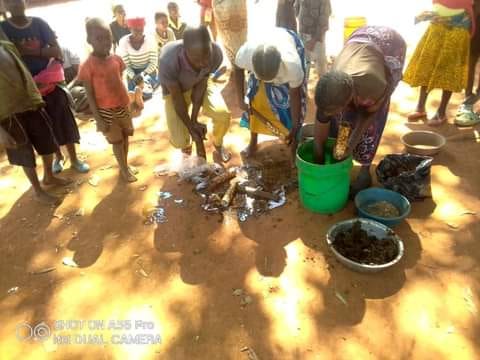NGO Trains Villagers to Make Briquettes for Cooking, Combating Climate Change
CERADI trained 1,250 on briquette-making to combat climate change.
MCHINJI, MALAWI — In a bid to combat climate change and protect the environment, the Centre for Research and Development Initiative (CERADI), a non-governmental organisation based in Mchinji, has trained over 1,250 men and women in briquette-making techniques, writes Gerald Fanuel.
The initiative, part of the Tigwirane Manja project, aims to provide alternative energy solutions that have a reduced impact on the environment and contribute to mitigating climate change.
The briquettes are made using waste products such as used papers, groundnut shells, dry tree leaves, sawdust, and maize bran mixed with cow dung or anthill soil.
The resulting briquettes are clean, smoke-free, and more environmentally friendly than charcoal or firewood.
Martha Chikuse, a beneficiary of the training and Chairperson for the Takondwa club in Katonde village, expressed gratitude for the skills acquired, stating, "The training has helped us acquire skills for making briquettes, which we use as an alternative to firewood for cooking and other domestic purposes."
Chikuse also noted that the new skills have reduced confrontations with government security guards protecting the forests and have allowed women to focus on income-generating activities such as Village Savings and Loan groups.
The United States Agency for International Development (USAID) highlights Malawi's challenges, including land scarcity, extreme poverty, and a rapidly growing population heavily dependent on natural resources, contributing to environmental degradation.
Maria Evas, another beneficiary, expressed optimism that the briquettes would help conserve the environment, stating, "The introduction of briquettes and fixed cooking stoves by CERADI has allowed us to focus on other activities and reduced our dependence on firewood and charcoal, which are increasingly scarce during the rainy season."
Florida Banda, Project Officer for CERADI, emphasised the positive impact of the initiative, which aims to empower women and girls by providing them with skills to start businesses and increase their ability to protect the environment and combat climate change.
Banda further highlighted the potential for income generation through the sale of briquettes and using briquette ashes as organic fertiliser.
The initiative has received support from Senior Group Village Head Samphara, who praised its recycling aspect and its potential to contribute to environmental conservation.
While the initiative has successfully trained individuals in making fixed cooking stoves, Banda noted that many of those trained have not yet received training in briquette-making.
However, Banda remains optimistic that more individuals will receive briquette training in the future.
Funded by the Commonwealth of Learning, the Tigwirane Manja project continues to make strides in promoting sustainable energy practices and empowering communities to combat climate change.



